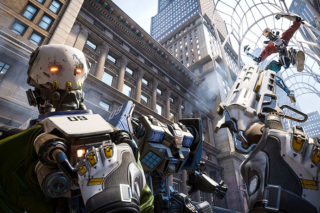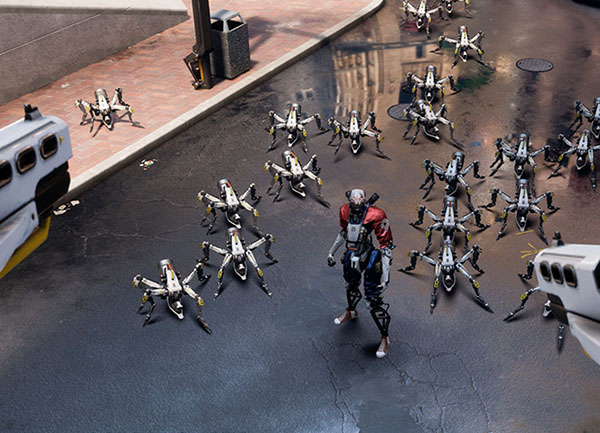Oculus fans had some good reasons to rejoice last week. Firstly, the Facebook-owned company announced a $200 price reduction, bringing the Oculus Rift headset and Oculus Touch controller bundle cost down to $598. Now, picking up a high-quality VR headset is more affordable than ever. Secondly, Robo Recall (developed by Epic Games) released, giving VR enthusiasts a frenetic, off-the-wall action game to dig into.
The free-to-play first-person VR game puts players in the role of an agent tasked with “recalling” rogue robots. That means destroying these malfunctioning droids by whatever means possible while discovering and upgrading weapons along the way. The game, which is a spirtual successor to the Bullet Train tech demo (which is also available for free on the Oculus Store), is a near-perfect VR shooter. Game sessions are usually about 10-15 minutes, and players return to a hub to upgrade their weapons, check their stats and prepare for their next mission.
Nick Donaldson, the lead designer for Robo Recall, told [a]listdaily that one of the aims in designing the game was to make one of the best reasons to own an Oculus Touch. He was joined by the game’s art director, Jerome Platteaux, who said that they were inspired by arcade games, where players could play for as long as they like while taking intermittent breaks. The two then discuss how mass robot destruction could help the VR industry grow and further popularize the Unreal Engine as the go-to game development tool.
In your words, what is Robo Recall about?
[Donaldson]: Robo Recall is a fun action shooter game that was built from the ground up for the Oculus Touch controller. We took advantage of as many of those features as possible. You can grab robots, throw them in the air, tear off their limbs and beat them to death. It’s ridiculous, over-the-top, and a lot of fun.
[Platteaux]: We want to make you feel as badass as possible—like a very well trained agent with a lot of skill and combos based on those skills.
This is a spiritual successor to the Bullet Train VR demo. Why create a whole new game instead of sticking to the established Bullet Train name?
[Donaldson]: With Bullet Train, we had a grand total of 10 weeks [to develop the game] from start to finish. We use the whole bunch of assets that we already had floating around in the [Unreal] engine. It was thrown together as quickly as possible, and we were just throwing stuff at the wall to see what would stick. But we wanted to take what we learned from that and make something that was uniquely ours. We took the same idea and the same things learned from Bullet Train and built them into something that we actually wanted to make rather than something that was sewn together.
[Platteaux]: Even the name came from us saying, “okay, we’re at a train station and we’re shooting bullets. Let’s call it Bullet Train.” There wasn’t a lot of thought that went into it, and we didn’t think about creating an IP. Now [with Robo Recall] we have a little bit more time and we can own it (the game) a little more and not have any licensing issues—there’s already a Bullet Train in Japan.
Would you consider Robo Recall as a starting point to having a full first-person shooter like Unreal Tournament in VR?
[Donaldson]: Robo Recall was built from the ground up for the Oculus. I kind of compare it to the early days of mobile, where if you asked gamers what they wanted, they said they wanted Skyrim on their phones. They would tell you that they wanted to play 40 hours in eight-hour sessions on their phones, when that’s not really what the mobile market wants or what works well on a mobile phone. Making a direct comparison between what a VR game should be to a PC game and genre that’s been around for decades is not something that needs to be done.
[Platteaux]: With VR, we still don’t know how long people like to play. We assume an hour or two will be fine, but I don’t know if people will play more than that. We don’t have a lot of numbers out there, but that’s one of the things that we’ll discover with the release of the game. All experiences will vary, depending on whether it’s a high-energy game that require a lot of movement. We think of it as a sprint—you play for about fifteen minutes, then go back to the hub to relax, then come back.
Why offer Robo Recall for free?
[Donaldson]: The VR market is not a place where a company can release a high-quality AAA product, funded by yourself, and make a whole bunch of money off of it right now. It’s still a very early, maturing market. Oculus gave us an opportunity by funding the development of Robo Recall. Since there isn’t a massive amount of money to be made, we saw more value in spreading those ideas and increasing the value of the VR market in general.
[Platteaux]: The game shows off what we can do with the Unreal Engine and a small team. Everybody can learn how to make their own game, and we’ve been making a lot of improvements, so the licensing of the Unreal Engine can reap those benefits.
How does launching and promoting a VR game compare to a traditional one?
[Donaldson]: It’s not too different. Stuff comes down to the wire, and we have to make the hard calls about what works and what doesn’t. As usual, we’re optimizing performance to get everything running properly right up to the line.
How have you been getting the word out about Robo Recall?
[Platteaux]: We put the Bullet Train demo on the Oculus Store for free with a small spot at the end that said, “look out for Robo Recall.” We also demoed it at Oculus Connect. It was a good demo and we got a lot of feedback.
[Donaldson]: We made a big splash there. We also put out some digital video documentaries, developer diaries, about the development of the game, and we showed the game at GDC.
 Besides being featured on the Oculus Store, what do you think is the best way to promote a VR game right now?
Besides being featured on the Oculus Store, what do you think is the best way to promote a VR game right now?
[Donaldson]: Having one of the big hitters like Oculus behind you and promoting the game is the absolute best way. It’s a pretty big trump card that we’re playing and we think that people who are into VR right now are pretty savvy about what’s out there and they’re hungry for content. So, putting this on the front page of the Oculus Store is going to get it in the hands of every single Oculus Rift owner out there.
Word-of-mouth is very valuable to VR at the moment. All of my neighbors know that I’m working on VR things, and they get super excited every time I want to show them something. These are not people who aren’t necessarily gamers in their college years, but they’ve heard about virtual reality, heard that it’s awesome, and they want to check it out. So, word-of-mouth is very powerful in that regard.
[Platteaux]: We’re probably also going to do a lot of livestreaming on our channels to talk about how we did the game. So, if people don’t know about it, they’ll see how we did it and maybe they’ll play after.
Oculus has separate PC game mobile VR divisions. Do you think a game like Robo Recall could be played on mobile platforms one day?
[Donaldson]: That’s the dream, isn’t it? The best thing about mobile VR is that you put it on your head and you’re in it. You don’t have cords to wrapped up in and you don’t have to worry about which way you’re facing. But the trickiest thing about mobile is that it doesn’t do positional tracking yet, and you don’t have the motion controllers in the same way. When the benefits of both of these converge, and Oculus announces its (wireless) standalone device—that’s the ultimate dream of VR. We’ll get to build whatever games we want.
[Platteaux]: That all depends on the mobile devices and how powerful they get. Of course, someday we’re going to have the same quality of graphics. The question is, what will the input be? What will be the controller? We’ll adapt the gameplay based on that.
What are your thoughts on how VR has grown so far and how do you see things progressing in the coming year?
[Donaldson]: It’s been an interesting year. We’ve seen a handful of developers do some really interesting things and we’ve been pretty shameless in checking out every game that comes out, taking all the ideas that we think are great and making them work in our game. The industry is still in a phase of learning what makes a great VR game. We’re all trying to solve the same problems at the same time. The development community is still very young and is ripe for fresh and new ideas.
[Platteaux]: The same thing goes for the content side. We’re starting to see what works and what doesn’t work in VR. What is the proportion that feels good? What is the most important thing to have?

